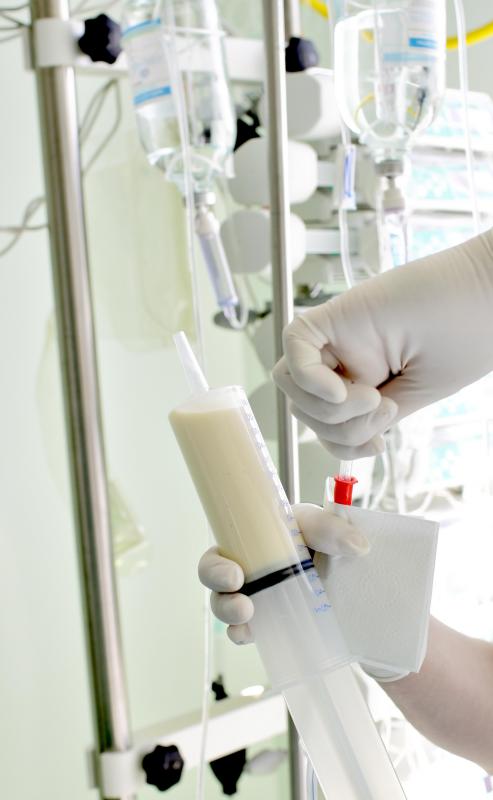At WiseGEEK, we're committed to delivering accurate, trustworthy information. Our expert-authored content is rigorously fact-checked and sourced from credible authorities. Discover how we uphold the highest standards in providing you with reliable knowledge.
What Are the Causes of Hypernatremia?
Hypernatremia is a rare but lethal disorder of the system that regulates electrolyte levels in body fluids. There are three main causes of hypernatremia, but each of these can be triggered in a variety of ways. The causes are an unreplaced loss of water, inadequate concentration of urine, and the ingestion of large amounts of high-electrolyte fluids. In each case, blood concentration of electrolytes rises to a dangerous level, with possible consequences such as respiratory problems and brain damage.
When more water is lost from the body than can be replaced, high blood electrolyte levels result, leading to hypernatremia. When blood concentrations of electrolytes — sodium in particular — begin to rise, the most obvious result is thirst. Most people can easily counter thirst by drinking water, which corrects the sodium imbalance. Hypernatremia is therefore relatively rare, but is a risk for people who cannot obtain water unaided. The causes of hypernatremia are categorized as hypovolemic, euvolemic, and hypervolemic.

Hypovolemic causes of hypernatremia are those which are caused by excessive water loss or inadequate water intake. The most common cause of all cases of hypernatremia is the inadequate intake of water. This is most often seen in people who are physically or mentally impaired, and who cannot drink water as often as they need to. Excess water loss is the second hypovolemic cause, and can result from severe diarrhea, extreme sweating, or excessive use of certain types of diuretic medications.

Euvolemic causes of hypernatremia are typically the result of diabetes insipidus, also known as water diabetes. Diabetes insipidus is caused by the malfunction of a hormone called vasopressin, which regulates the excretion of water by the kidneys. In these cases, hypernatremia results from excretion of large amounts of dilute urine. This concentrates the remaining body fluids and results in high blood levels of electrolytes.

The rarest causes of hypernatremia are those which are hypervolemic in nature. This type of hypernatremia is most often due to the excessive ingestion of hypertonic fluids, which are fluids containing higher concentrations of electrolytes than are naturally present in the body. Examples of such fluids include seawater and some sports drinks.
Regardless of the causes, hypernatremia results in symptoms such as weakness and lethargy, irritability, and edema. These symptoms develop because the body quickly adapts to higher electrolyte concentrations, and as a consequence cells take up excess water and begin to swell. Seizures can occur as a result of swelling in the brain, and if not treated effectively, the condition can progress to coma and death.
AS FEATURED ON:
AS FEATURED ON:














Discuss this Article
Post your comments